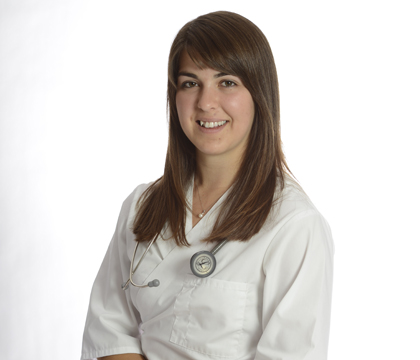
Farm crisis sparked student's vet aspirations
When Shannon Palmer of Port Alberni, B.C., was 16, the Canadian Food Inspection Agency quarantined her family's sheep flock for eight months because of possible exposure to scrapie — a fatal disease in sheep and goats.
By Lynne GunvilleWhile it was a challenging time for her family, the crisis sparked Palmer's interest in infectious diseases and kindled her desire to pursue veterinary medicine — the same career as her mother, Dr. Patricia Radcliffe (WCVM '85).
"By the time our animals were cleared and the quarantine was lifted, I had no doubts left: I wanted to be a vet," said Palmer, who eventually enrolled in the Bachelor of Science in Agriculture degree (animal science) program at the University of Saskatchewan.
As an agriculture student, Palmer spent a summer working on a project involving the porcine reproductive and respiratory virus (PRRSV) and carried out a cattle-related research project in her third year of university.
She was accepted by the Western College of Veterinary Medicine (WCVM) in June 2014. Palmer and her classmates were welcomed to the veterinary profession on September 19 during a white coat ceremony in Saskatoon, Sask.
After studying physiology, anatomy and nutrition of domestic animals from a production point of view, Palmer looks forward to building on that knowledge from an animal health perspective.
Palmer also brings a set of valuable life skills acquired through her 10-year involvement in 4-H. She competed in public speaking on a provincial level, and she learned leadership and teamwork skills as well as an appreciation for her agricultural background.
Palmer, who was chosen president of her class, looks forward to being involved in more research after she graduates. She's particularly interested in infectious disease and One Health — a global initiative that promotes collaboration among all health professionals.
"My favourite part about research is knowing that you're doing work that has the potential to make a difference — not just to one animal or one farm, but possibly to an entire industry."
